

To Be Exercise at Auto-English. Gerunds. Forming the Simple Past Tense (Regular Verbs) Positive statements in the Simple Past, regular verbs. Los verbos irregulares en inglés (=English irregular verbs) Los verbos irregulares en inglés (=English irregular verbs) En inglés, hay una serie de verbos cuyo Simple Past (Pasado Simple) y Past Participle (participio pasado) no siguen ninguna regla, y por lo tanto, son los llamados verbos irregulares.
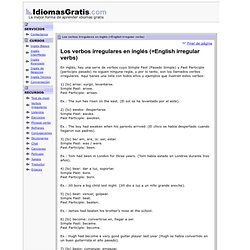
Aquí tienes una lista con todos ellos y ejemplos que ilustran estos verbos: 1) (to) arise: surgir, levantarse. Simple Past: arose. Past Participle: arisen. Ex.: The sun has risen on the east. 2) (to) awake: despertarse. Ex.: The boy had awaken when his parents arrived. 3) (to) be/ am, are, is: ser, estar. Ex.: Tom had been in London for three years. 4) (to) bear: dar a luz, soportar. Ex.: Jill bore a big child last night. 5) (to) beat: vencer, golpear. Ex.: James had beaten his brother's nose at the school. 6) (to) become: convertirse en, llegar a ser.
Ex.: Hugh had become a very good guitar player last year (Hugh se había convertido en un buen guitarrista el año pasado). 7) (to) begin: comenzar, empezar. Ex.: John has begun his career as an actor. Do vs. Make - Lección de Inglés: El verbo hacer- Present Continuous 1. Verb Tense Exercise 1. Present Continuous - Practice Forming Present Continuous Tense. English Grammar Practice.
Created by: Nikita Kovalyov Updated: June 2004 [ Present Continuous Tense - When to use ] [ Positive Sentences ] [ Negative Sentences ] [ Yes/No Questions ] [ Information Questions ] [ Practice Forming Present Continuous ] [ The ING Forms Of The Verbs ] [ English Action and State verbs ] [ Present Continuous and Present Simple Tenses ] [ Present Continuous Test ] Exercise: Put the verb in brackets in the correct form to make different form of the Present Continuous Tense.
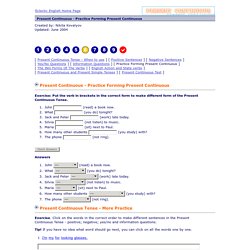
Answers John (read) a book now.What (you do) tonight? Jack and Peter (work) late today.Silvia (not listen) to music.Maria (sit) next to Paul.How many other students (you study) with? The phone (not ring). Vote for our website! Simple Present vs. Present Progressive. Exercises and tests Form See also explanations on Simple Present and Present Progressive Use In general or right now?
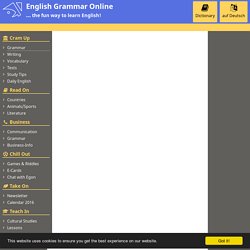
Do you want to express that something happens in general or that something is happening right now? Verbos Irregulares Ingles. Simple Present or Present Progressive/Continuous. Verbos irregulares con pronunciación interactiva: English irregular verbs with pronunciation. 1/6. ESL Classroom Jeopardy Quiz Show Irregular Verbs Past Simple. ESL Interactive Fun Games Here we have the games carefully laid out for you.

Follow the links to browse the variety of games offered. This is only the directory for interactive games and exercises. Our ESL fun games here include : Snakes and Ladders, Hangman, Spelling games, Wheel of Fortune, TV Games(Betting Game), Mazes, Memory Games, Matching exercises, Sequencing exercises, Picture Quizzes, Catch it and more. These games provide the ultimate fun in practising the following skills: Irregular past tense verb spelling. ESL Interactive Fun Games Here we have the games carefully laid out for you.

Follow the links to browse the variety of games offered. This is only the directory for interactive games and exercises. Our ESL fun games here include : Snakes and Ladders, Hangman, Spelling games, Wheel of Fortune, TV Games(Betting Game), Mazes, Memory Games, Matching exercises, Sequencing exercises, Picture Quizzes, Catch it and more. Online English Course - Unit 19 Have/Have got. Grammar 1.
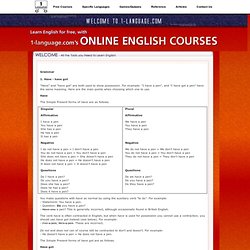
Have - have got "Have" and "have got" are both used to show possession. For example: "I have a pen", and "I have got a pen" have the same meaning. Here are the main points when choosing which one to use. Have or has got. Simple Present: Yes/No Questions. Verb Types in English - Guide to Verb Types. ESL Fun Grammar Games,Past Simple Sequencing Activity. ESL Interactive Fun Games Here we have the games carefully laid out for you.
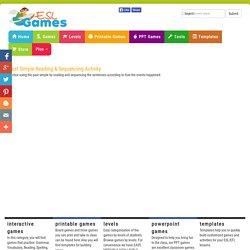
Follow the links to browse the variety of games offered. This is only the directory for interactive games and exercises. Our ESL fun games here include : Snakes and Ladders, Hangman, Spelling games, Wheel of Fortune, TV Games(Betting Game), Mazes, Memory Games, Matching exercises, Sequencing exercises, Picture Quizzes, Catch it and more.
These games provide the ultimate fun in practising the following skills: Past Tense Regular Verb Pronunciation. Sentences and questions in the Simple Past. Positive statements in the Simple Past, regular verbs. Was - Were - Past Tense of To Be - Teaching Simple Past to Beginners - Beginning English Lesson. The verb 'to be' is used in many questions such as "Are you married?
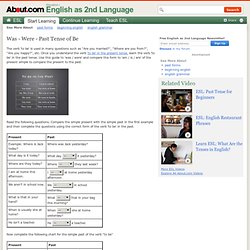
", "Where are you from? ", "Are you happy? ", etc. Once you understand the verb 'to be' in the present tense, learn the verb 'to be' in the past tense. BE Verb - Present and Past. Simple Past: Regular Verbs 1. Forming the Simple Past Tense (Regular Verbs) Irregular verbs. Verb Tenses Exercises Online. Online English Course - Unit 18 Can/Can't. USED OF PRESENT PROGRESSIVE. Going to. Lesson B going to, present continuous (2) Going to-future. Present perfect with already, yet, just.
Verbos Irregulares Ingles. Was - Were - Past Tense of To Be - Teaching Simple Past to Beginners - Beginning English Lesson. Learn English - Fully Conjugated English Verbs - BIG English Verb list - English Verb Chart. Simple Present 1. ESL EFL English CLassroom Language - Special Phrases for Use in the Classroom when asking questions. Irregular plurals. Present Continuous. [am/is/are + present participle] Examples: You are watching TV.
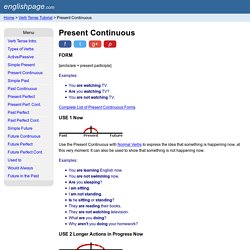
Are you watching TV? You are not watching TV. Complete List of Present Continuous Forms USE 1 Now Use the Present Continuous with Normal Verbs to express the idea that something is happening now, at this very moment. You are learning English now. USE 2 Longer Actions in Progress Now In English, "now" can mean: this second, today, this month, this year, this century, and so on. Examples: (All of these sentences can be said while eating dinner in a restaurant.) I am studying to become a doctor. USE 3 Near Future Sometimes, speakers use the Present Continuous to indicate that something will or will not happen in the near future. I am meeting some friends after work. USE 4 Repetition and Irritation with "Always" The Present Continuous with words such as "always" or "constantly" expresses the idea that something irritating or shocking often happens.
She is always coming to class late. Present Simple Negative Verbs (Letitia Bradley. Simple Present - Spelling. Negatives and Questions in the Simple Present Tense. Present Continuous - Practice Forming Present Continuous Tense. English Grammar Practice.